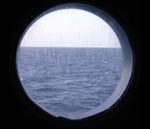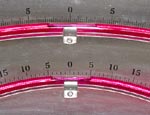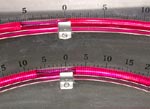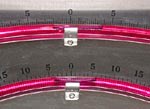|
Hot Topics: Seasickness By Lonny LippsettIt’s a fact of life on ships, but nobody talks about it much. Why should they? It’s not a pretty picture. Yep, I’m talking about the green scourge, Neptune’s revenge—seasickness. It sounds better in French—mal de mer—but I bet it doesn’t feel any better in French.
So, I wanted to learn some more about what causes seasickness. Atlantis’ Third Engineer, Phil Treadwell, summed it up well: “Your eyes tell you one thing,” he said, “and your body tells you another.” In the inner part of your ear, there are three semicircular canals that are filled with fluid. It’s called the vestibular system. When your body moves, the fluid in these canals sloshes back and forth or up and down. The system tells you which direction your body is moving and how fast. It gives you your sense of balance. Your semicircular canals are accustomed to horizontal motion, such as walking. But your body less frequently encounters vertical motion. Bumpy airplanes, roller-coasters, and elevators cause fluid in the semicircular canals to go up and down. That stimulates nerves in your brain, and you get that sudden falling feeling. Human beings are generally landlubbers, so they don’t ordinarily experience the motions of a ship at sea. Ships have quite a repertoire of these, said First Mate Mitzi Crane. There is rolling, when one side of the ship rolls toward the water and then the other side does. There is pitching, when the ship’s bow and stern (front and back) sway up and down like a seesaw. And then there is yawing, which is sort of a jumbled combination of these with a few other nasty movements thrown in. Imagine how that jostles the fluids in your inner ear. Big ships like Atlantis, fortunately, don’t yaw much. Seasickness happens when your inner ear and your eyes send confusing signals to your brain. Your eyes looks at the deck or at your cabin walls. These are ordinarily non-moving things, so your eyes are telling your brain that all is stable. Your inner ear, on the other hand, may be screaming to your brain that the world is constantly moving in many unusual directions. No wonder the brain gets confused—and stressed. Then the body gets distressed. Symptoms included headache, dizziness, queasiness, that cold, clammy feeling on your skin, a skin tone similar to the Wicked Witch of the West ... let’s stop there. As the old saying goes, seasickness won’t kill you, although you can feel so bad you might pray it would. However, sufferers can get dehydrated from vomiting, and that’s dangerous, Mitzi said. There are several medications that help some people overcome seasickness. Some comes in pill form. Another is a patch that sticks behind your ear and dispenses medicine through your skin. Some people say wrist bands that apply pressure to a particular spot can help, but there is no medical explanation for this. In all cases, it is best to take medicine before you get motion sickness, rather than once it has started. All sailors know the classic cure: “Look at a fixed point in the distance—like the horizon,” said Oiler Mike Spruill. “A star works at night.” Craig McLean, who is on this expedition as director of NOAA’s Ocean Exploration Program and who was a captain on a NOAA vessel, said that when he noticed a crew member looking susceptible to seasickness, he would give him or her a task to do on deck. “Fresh air and something to keep your mind busy, so you don’t dwell on the motion,” he said. Everyone is different. Some people are never troubled. Some people get seasick, and some people get very seasick. Some people get seasick on some ships, but not on others. “Every ship has its own quirks—just like people,” said Chief Engineer Kevin Fisk. Mitzi has been sailing for more than 20 years without any problems, but she has not-so-fond memories of one trip on the “O-boat”—Woods Hole Oceanographic Institution’s Oceanus. Its particular motion didn’t suit her. “Alvin is mandated to go down only in good weather,” Mitzi said, “So Atlantis usually follows good weather around. This is a sweet ride.” But even on Atlantis, “sometimes you get chased by a storm that travels up the coast with you,” Mitzi said. “You’re constantly fighting to put your foot down in the right place, to stand, to hold onto your plate at dinner. You wedge yourself in your rack (bunk), but you don’t get much sleep. After a couple of days of that, you’re really tired and your resistance goes down. It even gets to some wily veterans.” “You can always tell something’s up when the bread and soup line in the galley gets longer and people start passing on the greasy fried food,” McLean said. Seasickness only seems like it lasts forever. But it doesn’t. It is relieved soon after you return to port. But after a long stretch at sea, it may take some time for you to re-adjust to solid ground again. There’s a name for this disease, too. It’s called “dock rock.”
|
|
© 2010 Dive and Discover™. Dive and Discover™ is a registered trademark of Woods Hole Oceanographic Institution
|
|




 In
the inner part of your ear, there are three semicircular canals
that are filled with fluid. These are not semicircular canals.
They are inclinometers on Atlantis, which measure the
ship’s roll. But the canals work in a similar way. When
your body moves, the fluid in the canals sloshes back and
forth or up and down. The system tells you which direction
your body is moving and how fast.
In
the inner part of your ear, there are three semicircular canals
that are filled with fluid. These are not semicircular canals.
They are inclinometers on Atlantis, which measure the
ship’s roll. But the canals work in a similar way. When
your body moves, the fluid in the canals sloshes back and
forth or up and down. The system tells you which direction
your body is moving and how fast.
